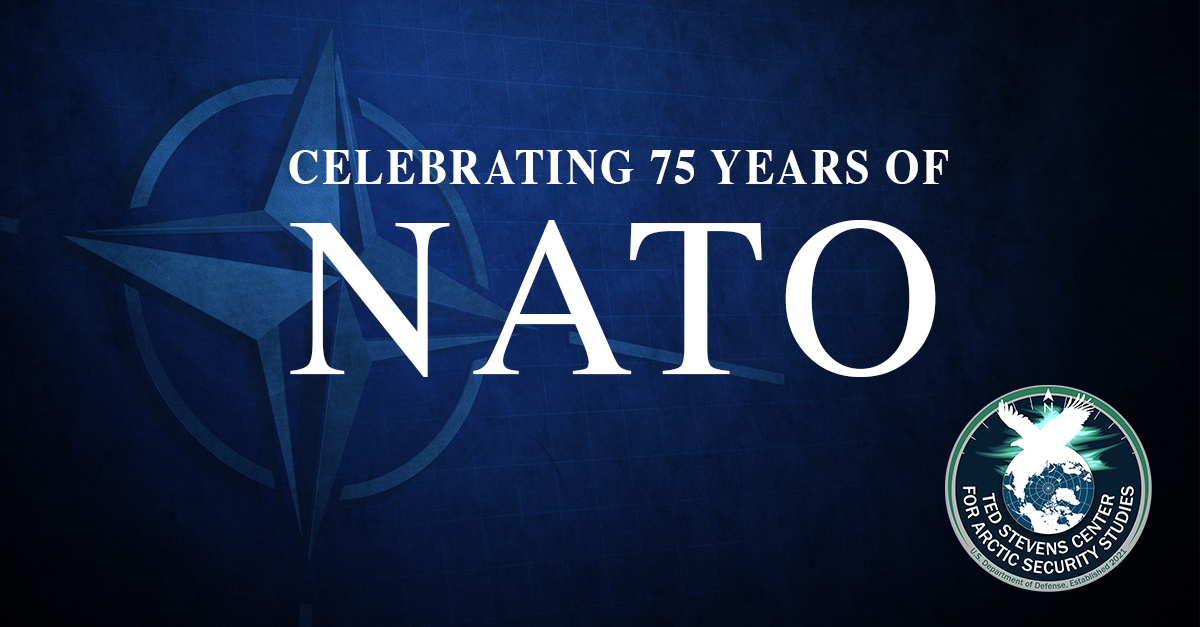
April 4, 2024, marks the 75th anniversary of the North Atlantic Treaty Organization. This significant milestone is a testament to the enduring strength and significance of the alliance.
“NATO is the world’s preeminent alliance. When NATO leaders routinely call it the most successful one in history, they’re not exaggerating. For three quarters of a century now, the alliance has been a unique, value-based framework backed up by real capabilities for the collective defense and broader security interests of its members,” explained Dr. Matthew Rhodes, professor of International Security at the Ted Stevens Center for Arctic Security Studies.
On April 4, 1949, twelve countries signed the North Atlantic Treaty in Washington D.C., committing to promote security in the North Atlantic region, safeguard freedom and democracy, and stand together for their collective defense. Of the twelve original NATO allies, the membership of the United States, Canada, Norway, Iceland, and the Kingdom of Denmark solidified the strategic significance of the Arctic region from the establishment of the alliance. Today, with 32 member nations spanning from Anchorage to Helsinki, NATO remains the bulwark of common security.
Rhodes, whose research areas include foreign policy, transatlantic relations, and European security, continued, “NATO has institutionalized the transatlantic bond and served as a broader stabilizing factor in the international order. Russia’s ongoing war of aggression against Ukraine and other emerging challenges underline its enduring value.”
2024 was a historic year for NATO and the Arctic: Sweden’s accession, along with Finland in 2023, brings seven of eight Arctic nations into the alliance. This latest expansion adds unique capabilities, commitments, and perspectives to our collective defense, as well as reaffirms the value of NATO to Arctic security.
“NATO has been in the Arctic since its founding. Finland and Sweden are highly capable countries that were already two of NATO’s closest partners. Their full accession brings all Arctic states except Russia into the alliance and strengthens deterrence and defense across the Arctic-Baltic area,” said Rhodes.
As the contemporary security landscape continues to evolve, so too does the alliance. NATO leaders will meet in Washington in July for NATO’s 75th anniversary Summit to discuss the continued security, resilience, and prosperity of the alliance.
“Adaptation has been key to NATO’s longevity. During the past couple of years, the alliance has again looked deeply at its further evolution through the NATO 2030 reflection process and new Strategic Concept. These have flagged not only the immediate threat from Russia but also other challenges such as emerging technologies and operational environment change. The key points for the alliance going forward will be effective implementation and resourcing of its resulting plans, continued unity, and engaging communication and outreach about its work also with younger generations,” explained Rhodes.
The Ted Stevens Center is committed to deepening relationships across the Arctic with NATO as the cornerstone of security cooperation. In the coming years, interested participants can expect a new course, developed and led by Dr. Rhodes, focused on NATO and the Arctic that is strategically driven, solution oriented, and partner-centric.
“The course will examine NATO’s growing role in the North. It will push participants to consider practical implications of developments across the Arctic and related challenges and opportunities for the alliance,” said Rhodes.
America’s network of allies and partners remains our most strategic advantage. The Arctic serves as a steadfast example of the enduring importance, resilience, and strength of the alliance. As NATO celebrates a historic 75 years, now more than ever, we are Stronger Together.
Graphic by Amber Kurka | April 4, 2024, marks the 75th anniversary of the North Atlantic Treaty Organization. On April 4, 1949, twelve countries signed the North Atlantic Treaty in Washington D.C., committing to promote security in the North Atlantic region, safeguard freedom and democracy, and stand together for their collective defense. Of the twelve original NATO allies, the membership of the United States, Canada, Norway, Iceland, and the Kingdom of Denmark solidified the strategic significant of the Arctic region from the establishment of the alliance. Today, with 32 member nations spanning from Anchorage to Helsinki, NATO remains the bulwark of common security. View Image Page
